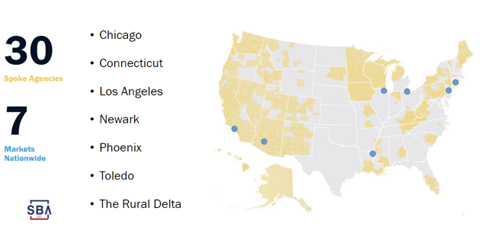This Small Business Week, we are highlighting how the Community Navigator Pilot Program, administered by the Small Business Administration, is investing in local and national partnerships with trusted organizations to reduce the barriers entrepreneurs face in accessing critical support. Partners work with small business owners across the country, including veterans, women, people with disabilities, and those from rural places and communities of color.
Starting and running a business is hard work, and small business owners often face significant challenges, especially entrepreneurs from marginalized groups and communities, people of color, veterans, women, and those located in disinvested urban and rural areas. The pandemic's impact on small businesses was a stark reminder of their vulnerability, particularly in the case of Black and brown entrepreneurs, whose businesses closed at double the rate of their white counterparts. While these disproportionate impacts highlighted the need to invest in hyper-local, place-based partnerships, ecosystem-building and creating access, those needs are not new.
To address these challenges, the federal government created the Community Navigator Pilot Program (CNPP) at the Small Business Administration (SBA). The program is building more inclusive ecosystems to better support all businesses by investing in partnerships with trusted organizations. Those business-supporting organizations, in turn, link and strengthen local efforts to help entrepreneurs with SBA-funded resources and centers. This innovative approach, which enhances access to capital by providing high-quality technical assistance, marketing, and digitalization support, among other services, is meeting small businesses where they are and helping bolster small businesses nationwide.
For too long, the SBA has lacked the resources and relationships necessary to reach deep into communities that face distinct challenges to entrepreneurship, – linguistic, geographical, cultural, financial, and technical. But over the past 17 months, the CNPP program has started to change this through a connection to 450 Business Development Organizations (BDOs) – known as spokes in this model – from all over the country. These organizations serve as trusted ambassadors on the ground, providing technical assistance, capital access and guiding business owners as they navigate the public and private resources available locally.
The LISC Approach
As a CNPP grantee, LISC is partnering with 30 of these “spokes” across seven markets: Chicago, Connecticut, Los Angeles, Newark, Phoenix, and the rural Mississippi Delta, which includes Arkansas, Kentucky, Louisiana, Tennessee, and Missouri, to expand their reach.
In this model, LISC is a “hub,” supporting those spoke organizations and has brought short-and long-term resources to areas disproportionately impacted by the pandemic. Through the CNPP, we are also investing in the infrastructure necessary for long-term recovery and growth in those markets, while building our organizational capacity to support small businesses and the BDOs supporting them.

LISC meets regularly with spokes in each market to ensure that joint planning, strategy, and delivery of services is seamless and that the local organizations learn from the larger network. LISC staff in those markets serve as boots on the ground and coordinate the day-to-day work, layering in additional resources to build the infrastructure that will help carry the work forward, beyond the grant period.
As a hub, LISC has provided on-going training and technical assistance to build the capacity of spokes and their small business clients. Topics include financial assistance and access to capital, and business coaching, contracting and procurement, marketing, operations, business development, exporting, and industry-specific training.
LISC is also developing curricula and delivering training and technical assistance to the network based on the needs of our partners. These comprise preparing small businesses for SBA loans, engagement strategies to reach the most vulnerable businesses, counseling and coaching, and how to navigate a centralized data management system. Through a partnership with the Georgia-based organization Quality Care for Children, we provide childcare business development expertise to spoke partners, who can in turn leverage lessons to better meet childcare providers' unique administrative, financing, and support needs.
As a result, many more entrepreneurs in rural and urban areas now have access to context-specific technical assistance and capital programming that meets their varied needs, including targeted support for agricultural industries, technology start-ups, and incubation support. LISC has also invested in minority entrepreneurs through an innovative range of financial products and services
Building Inclusive Small Business Ecosystems
We define ecosystems as a set of conditions and supports that all entrepreneurs need to thrive – to launch and expand their businesses, and to sustain them in the face of economic shocks and other impediments to growth.
In fact, LISC launched an “Ecosystem Building” training with Next Street to foster collaboration and trust among partners within local ecosystems. The project resulted in a playbook, Building Organizational Capabilities in Service of Equitable and Inclusive Small Business Ecosystems, that outlines how organizations serving small businesses can work together to identify ecosystem-level and organization-specific strategies that nurture equitable small business ecosystems in historically underinvested places. LISC, in turn, incorporated these strategies through virtual and in-person sessions for spokes, helping them better define their roles and use data to advance their work.
The Community Navigators program is fundamentally ushering in systems change work across the country. Through our commitment to local small business ecosystems, creating a shared language, being data driven, accessing new opportunities, and leveraging a multitude of fundings sources in organizations across the country we are fundamentally changing the way underserved small businesses are supported.
From Recovery to Sustainability
At LISC, this work means we are building a sustainable framework that bolsters organizational capacity focused on supporting small businesses and the BDOs critical to building an inclusive economy. Whether it’s a woman-owned small business in Arkansas obtaining business counseling and a loan to launch their online store, a veteran-owned enterprise in Ohio accessing affordable capital to move into a physical storefront or a minority-owned restaurant in Connecticut securing a commercial loan to buy their building, the CNPP invests in resiliency.
We strongly urge Congress to continue funding CNPP through the unfolding appropriations process to ensure we can continue expanding inclusive resources for hard-to-reach small business owners. We know this work is integral to the success of communities and the small businesses we all depend on.
If you are interested in learning more about LISC’s Community Navigator Pilot Program, please visit SBA Community Navigator Pilot Program | Local Initiatives Support Corporation (lisc.org)
About the Authors
 Destiny Allen, Senior Program Officer
Destiny Allen, Senior Program Officer
As an Economic Development Program Officer, Destiny is responsible for supporting a wide range of small business and business development organizations support initiatives; focusing on helping partners strengthen their services to support Black, Indigenous and People of Color, women, and veteran entrepreneurs and building inclusive small business ecosystems in communities across the country. Prior to joining LISC, Destiny worked with Southern Maryland supporting economic development, business engagement, community development and entrepreneurial ecosystem building. Destiny is passionate about relationship building and being a community convener and connector. Destiny holds a master’s degree in Public Administration (MPA) from the University of Georgia and a bachelor’s degree in Economics from Xavier University in Cincinnati, Ohio.
 Michelle Harati, Senior Policy Officer
Michelle Harati, Senior Policy Officer
Michelle advocates for federal policies to broaden pathways to opportunity, supporting multiple LISC national programs, including: economic development and small business, workforce development and financial capability, creative placemaking, and AmeriCorps. Before joining LISC, she worked with the City of San Diego Economic Development Department as a Community Development Specialist. She was also a Senior Asset Building Coordinator at the International Rescue Committee's (IRC) Financial Opportunity Center in San Diego and served two terms as an AmeriCorps member. Michelle holds a B.A. in Political Science from the University of California, Los Angeles, and a M.P.P. from Georgetown University.
@michelleharati